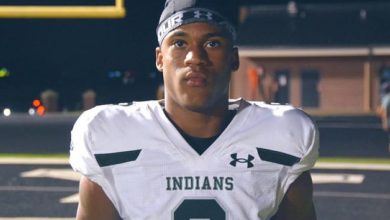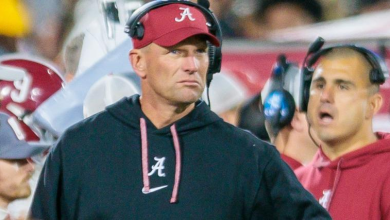A significant NIL change is on the horizon for Georgia football, potentially reshaping recruitment and athlete compensation strategies.

The landscape of college football has undergone significant changes over the past few years, with one of the most impactful being the rise of Name, Image, and Likeness (NIL) rights. Since the NCAA introduced NIL rights in July 2021, college athletes have had the ability to profit from their name, image, and likeness, which has transformed how recruits view potential programs and how teams approach their recruitment strategies.
For top programs like the University of Georgia (UGA), the introduction and evolution of NIL rights has already played a significant role in reshaping recruitment dynamics and the overall college sports experience. As the college football world continues to evolve under these new NIL rules, Georgia, consistently ranked among the elite programs, is set to undergo a major shift in how it approaches NIL deals, athlete compensation, and the recruitment of future players. The impending changes at Georgia could signal a new era in college athletics, one that blurs the lines between amateurism and professional sports.
Understanding the Current NIL Landscape
To understand the upcoming changes at Georgia, it’s important to first grasp the current NIL landscape in college football. Since the NCAA’s NIL policy implementation in 2021, athletes have been allowed to enter into sponsorship agreements with businesses, promote products, and engage in various activities that generate income. This has created a new playing field in recruiting, as the financial aspect of an athlete’s future has become an increasingly important consideration when choosing a school. For programs that are successful on the field and have a large fanbase, like Georgia, this has meant big opportunities for players to sign endorsement deals and monetize their visibility.
However, while the idea of NIL rights has opened new revenue opportunities for athletes, it has also presented challenges. The lack of uniformity in NIL deals across programs, the rapid rise in competitive bidding for recruits, and concerns about equity have all added complexity to the situation. Some schools have struggled to create NIL opportunities for athletes, while others have excelled in securing lucrative partnerships for their players. As these NIL landscapes continue to evolve, schools like Georgia are faced with the difficult task of finding ways to provide equitable opportunities for all athletes, while remaining competitive in a growing financial arms race.
Georgia’s Current NIL Standing and Successes
As of now, Georgia’s football program has been one of the most successful on the field, with a track record of winning national championships, high rankings in recruiting, and a growing alumni network. The university, under the leadership of head coach Kirby Smart, has cultivated an environment that has attracted top-tier talent, and the program has quickly become a powerhouse in college football.
Georgia has also been quite effective in leveraging NIL opportunities for its athletes, using its resources to secure lucrative deals for players. These opportunities, for many, serve as an additional recruiting tool, especially for high school prospects who are looking at the financial benefits of playing for a major program. NIL deals in Georgia’s football program have included individual partnerships for star players, such as Stetson Bennett and Jalen Carter, as well as group initiatives that allow players to share in the success of the team’s brand.
However, with the influx of larger NIL deals, rising competition for top recruits, and a growing concern over the disparity in how different programs approach NIL deals, Georgia’s leadership has recognized the need for adjustments to its current system. It’s clear that to remain competitive on the national stage, the Bulldogs will need to push the envelope further.
The Major NIL Changes Ahead for Georgia Football
While exact details of Georgia’s new NIL strategy are still emerging, several reports and discussions from insiders indicate that a substantial change is on the horizon. This shift will likely involve the creation of a more comprehensive and streamlined approach to NIL that seeks to enhance Georgia’s recruiting power, retain its current players, and maintain its competitive edge in the highly lucrative world of college athletics.
Here are several key factors that will shape Georgia’s upcoming NIL landscape:
1. Collective Deals and Group Sponsorships
One of the major changes Georgia is expected to embrace is the increased focus on collective NIL deals and group sponsorships. Rather than negotiating individual deals for athletes, Georgia is likely to create collective agreements that allow players to benefit from a shared pool of sponsorships. These collectives would allow the university to partner with local businesses, national brands, and corporations to ensure all players—regardless of their position or star status—have access to financial opportunities.
This approach addresses the issue of equity that has emerged in the NIL space, as some players at top schools have been able to secure significant deals, while others with less visibility have struggled to find partnerships. With collective deals, Georgia can create a more equalized distribution of NIL compensation, ensuring that athletes from all areas of the roster can benefit from the university’s resources. This model also helps level the playing field for Georgia in a competitive recruiting environment where financial incentives have become central to many recruits’ decision-making process.
2. NIL Resource Centers and Guidance for Athletes
As part of its NIL evolution, Georgia is likely to establish more structured NIL resource centers for athletes. These centers would provide guidance on how to navigate the world of sponsorships, investments, and financial management. While Georgia already has an impressive support system in place, this resource center would help athletes better understand their earning potential, how to negotiate contracts, and how to manage their finances.
Athletes would also receive guidance on how to build their personal brand, create content, and grow their social media presence in a way that maximizes their NIL opportunities. This type of support system would go beyond just helping athletes secure individual deals—it would teach them how to use their status as college athletes to create long-term financial success. For Georgia’s program, this would solidify its reputation as one of the most athlete-focused schools in the country, helping it recruit top talent that values both the athletic and business opportunities available.
3. A Dedicated NIL Leadership Team
In recognition of the growing importance of NIL, Georgia is likely to develop a dedicated NIL leadership team that works closely with both coaches and athletes. This team would be responsible for identifying new business partnerships, creating custom NIL deals, and helping athletes build relationships with potential sponsors. With more resources devoted to NIL, Georgia would be in a better position to help its athletes generate revenue and benefit from their success, all while complying with NCAA rules and regulations.
This team would be part of Georgia’s broader commitment to supporting its athletes, ensuring that NIL is not just a tool for securing high-profile recruits but also a resource for current players who are seeking to increase their earning potential. Georgia’s new NIL approach would emphasize long-term development, empowering athletes to capitalize on their fame and visibility throughout their college careers.
4. Attracting Major Sponsorships and Partnerships
As one of the premier football programs in the country, Georgia’s ability to land major sponsorship deals and high-profile partnerships will be crucial to the success of its NIL strategy. The school has already attracted significant national sponsors, but with the anticipated changes, it is expected that Georgia will push harder to secure exclusive deals with major brands. These partnerships could involve co-branded marketing campaigns, endorsements from Georgia players, and even sponsorships tied directly to performance metrics (such as collective bonuses for national championships or bowl game wins).
Given Georgia’s national stature, there is an opportunity to partner with larger corporate sponsors who want to capitalize on the power of the school’s football program. These lucrative partnerships could result in better NIL compensation for athletes while boosting the university’s brand recognition and revenue.
5. NIL Transparency and Compliance
A critical issue that has emerged with the explosion of NIL deals across college football is the need for transparency and regulation. With schools operating in varying degrees of compliance and fairness, the NCAA has been under pressure to ensure that NIL deals are handled ethically and fairly.
Georgia’s anticipated changes may include a greater emphasis on NIL transparency, where athletes and coaches alike will have access to information about what is being offered and the potential opportunities available. This transparency would also serve to minimize any external pressures or conflicts of interest that may arise from NIL deals and ensure that all athletes, regardless of their fame or position on the team, have equal access to the available opportunities.
Impact of These Changes on Recruiting
The upcoming changes to Georgia’s NIL strategy are expected to significantly impact the recruitment process. Given that financial incentives have become a central consideration for high school prospects, Georgia’s more robust approach to NIL will help the school attract top-tier recruits who are looking for a program that offers more than just excellent coaching and facilities.
With collective NIL deals and a structured support system in place, Georgia will be in a strong position to continue to lure in top talent, not only from across the country but also from recruits who may have been previously swayed by schools with larger NIL offers. This holistic approach to NIL will help Georgia stay competitive in an era where financial considerations are becoming increasingly important in recruitment.









